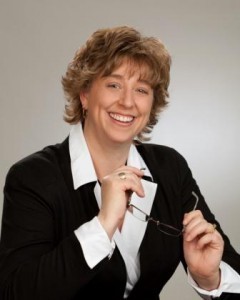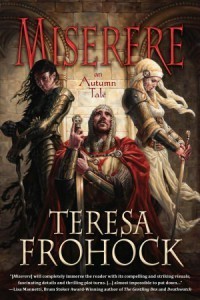A dialogue on the "Common kickass heroine"

Author Teresa Frohock
Recently my friend, author Teresa Frohock, brought to my attention a review of a current urban fantasy/paranormal romance title in which the reviewer referred to the main character as "the common kickass heroine." We were both struck by the implications: that what was once a fresh symbol of female empowerment in the male-heavy world of fantasy had become, through repetition and erosion, a cliche.
Since my most recent novel, The Hum and the Shiver, features a heroine I consider "strong," and Teresa's novel Miserere: An Autumn Tale has both a vivid warrior-priestess heroine and a terrific female villain, we discussed what the "common kickass heroine" might be, and what it means for writers and readers. Teresa, what's your background with strong heroines?
Teresa Frohock: In spite of all the novels I've read over the years, two strong heroines that have always remained me are Vonda McIntyre's Snake from her novel Dreamsnake and Anne McCaffrey's Killashandra from her novel The Crystal Singer. Both characters are portrayed as intelligent and emotionally strong young women who meet their obstacles with resourcefulness and determination. Those were the qualities I wanted for both Rachael and Catarina in Miserere.
This emotional strength was one of the aspects of Bronwyn that I admired so much in The Hum and the Shiver. She is a young woman who took chances and stepped outside the traditional paradigm to become someone with an inner depth that can't be camouflaged with flash and glitter.
What was your basis for Bronwyn's strength in The Hum and the Shiver?
Brownyn is a reaction to all those "Casablanca" endings, where the hero/ine makes some noble sacrifice in the service of some "greater good." I wanted her to decide that yes, I'll accept these responsibilities you've been pressing on me all my life, but on *my* terms. It's the kind of strength that you don't see very often, and has little to do with mundane things like "ass kicking." It's strength of *character.* Rachael in Miserere has that, despite a betrayal that would send most of us to the bottom.
I still feel the template is Ellen Ripley in Aliens. She has no super powers or lethal skills, just a steely determination that exceeds even that of the professional soldiers around her. Alas, once "Buffy" came along, the idea that tiny women must demonstrate their strength by destroying large men/supernatural creatures overwhelmed the concept of strength being a non-physical attribute. Now the Manic Pixie Dream Girl, Ass-kicking Version, is the standard.
Do you think that's because perhaps deep down, both readers and writers can't reconcile the idea of strength with attractiveness?

Teresa's terrific first novel
Yes, and I think part of it is a backlash to earlier tropes. Let's face it: Daphne and Thelma in Scooby-Doo always perpetuated the trope that you can't be both beautiful and intelligent. In high school, I read The Rebel Outlaw: Josey Wales by Forrest Carter and the character Laura Lee is described as plain. Her hands were too large to hold teacups but perfect for holding a rifle. I related to Laura Lee based on that description, because I knew how she felt. A woman couldn't be strong and beautiful. Now all the female characters are dainty with hands perfect for holding both teacups and assault rifles.
This is obviously how women want to see themselves. Everyone wants to relate to the characters in a story, but there is also a need to see grander pictures of ourselves. These "strong" women want to be seen as sexually attractive/aggressive, but the assault rifle (or Ninja sword or whatever) says: I don't need a man. I can take care of myself.
I'm curious about what guys see in characters like this. Do you see them as empowered women or caricatures?
It's hard to say, because I think I've aged out of the target audience. Certainly younger men, gamers and serious comic book fans, respond to these images. The entire anime industry probably wouldn't exist without them. But for me, yes, they feel like caricatures. The only possible justification for them is that they have supernatural powers, which I think gets us closer to the cliché we began with. All these women shown from the neck down on book covers, displaying their tramp-stamp tattoos as they carry some bladed weapon loosely in their fingers, are the result of trying to "realistically" have it both ways: heroines who are conventionally attractive, yet capable of battling the bad guys.
But what makes this so interesting, to me, is that this stereotype is promulgated by women, for women in the paranormal romance genre. Which leads into the question of, is emulating male sexuality really a sign of liberation, or just more cliché?
I don't think emulating male sexuality is a sign of liberation at all. I find it demeaning to women that we have taken the very aspects of male behavior that women disdain and flipped those male defects into virtues for women. Men who use sex as a weapon are animals, but women who use sex as a weapon are empowered? How did we hit that point? The sexual liberation I remember being discussed by feminists was all about being in control of our bodies and fates in a society that demeaned us all as brainless sluts.
I digress.
From an authorial viewpoint, any character that suffers a lack of emotional growth in the course of the story is in danger of becoming a cliché. I think the "common kick-ass heroine" will eventually go the way of the "Sam Spades". There will always be some novels with those kinds of characters, but they won't be as prevalent. Which makes me wonder what might be the next big thing?
The next big thing is always impossible to predict. I've heard it would zombies, but while they're popular, I can't see a single zombie character becoming a romantic symbol. I've also heard angels would be next, but again, while they're often used, I don't see any becoming the romantic symbol that vampires and werewolves have become.
What do you think?
I'd like to think the next big thing would be … normal men and women. I'm not counting on it though. I'm still trying to get the zombie thing. I'd throw my money on fallen angels. Not because I write them—nobody is going to be flinging themselves on my version of the fallen—but I have seen a lot of bare male chests on cover art along with fallen angel references. Someone is just going to have to come up with the right combination that clicks with the fans, I suppose.
Teresa's novel Miserere: an Autumn Tale is published by Night Shade Books, who also did the hardcover edition of my novel The Sword-Edged Blonde. You can read my review of her book here, and find out more about Miserere, including a free read of the first four chapters, here.



